-
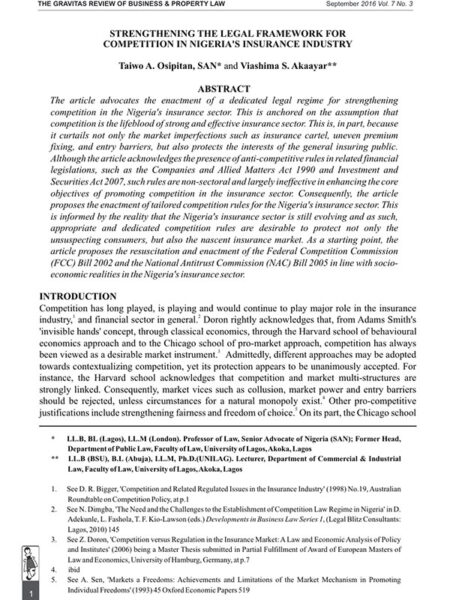
Strengthening the Legal Framework for Competition in Nigeria’s Insurance Industry
0₦2,500.00Professor Taiwo Osipitan, SAN and Dr. Viashima Akaayar of the Faculty of Law, University of Lagos in their article, “Strengthening the Legal Framework for Competition in Nigeria’s Insurance Industry” examine the concept and theories of Competition. Though they acknowledge the presence of antitrust rules in financial legislations such as the Companies and Allied Matters Act 1990 and the Investment and Securities Act 2007, they posit that such rules are non-sectoral and largely ineffective in enhancing the core objectives of promoting competition in the insurance sector. To protect unsuspecting customers, they propose the resuscitation and enactment of the Federal Competition Commission (FCC) Bill and the National Antitrust Commission (NAC) Bill.
-
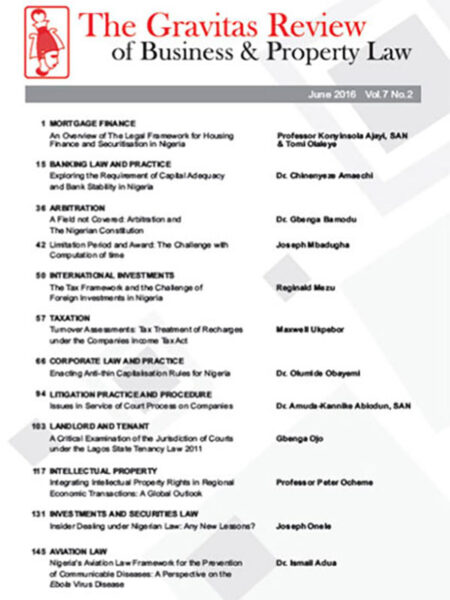
The Gravitas Review of Business & Property Law Vol.7 No.2 – Print
0₦5,000.00In this issue of The Gravitas Review of Business & Property Law Vol.7 No.2, there are well researched articles on:
- Mortgage Finance
- Banking Law & Practice
- Arbitration
- International Investments
- Taxation
- Corporate Law & Practice
- Litigation Practice & Procedure
- Landlord and Tenant
- Intellectual Property
- Investments & Securities Law
- Aviation Law
-

The Gravitas Review of Business & Property Law Vol.7 No.2 – E-Book
0₦5,000.00In this issue of The Gravitas Review of Business & Property Law Vol.7 No.2, there are well researched articles on:
- Mortgage Finance
- Banking Law & Practice
- Arbitration
- International Investments
- Taxation
- Corporate Law & Practice
- Litigation Practice & Procedure
- Landlord and Tenant
- Intellectual Property
- Investments & Securities Law
- Aviation Law
-

The Gravitas Review of Business & Property Law Vol.7 No.2
0₦5,000.00In this issue of The Gravitas Review of Business & Property Law Vol.7 No.2, there are well researched articles on:
- Mortgage Finance
- Banking Law & Practice
- Arbitration
- International Investments
- Taxation
- Corporate Law & Practice
- Litigation Practice & Procedure
- Landlord and Tenant
- Intellectual Property
- Investments & Securities Law
- Aviation Law
-
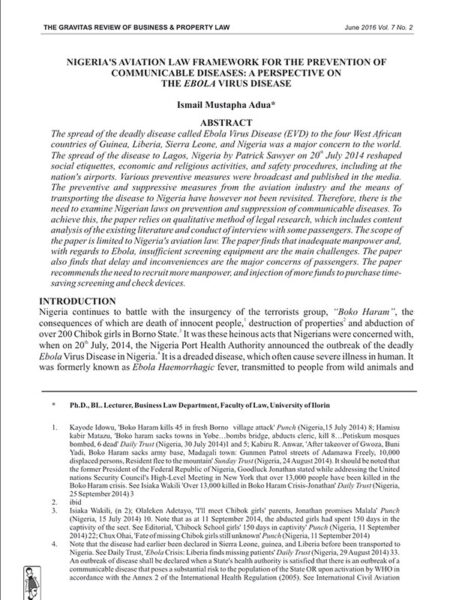
Nigeria’s Aviation Law Framework for the Prevention of Communicable Diseases: A Perspective on the Ebola Virus Disease
0₦2,500.00Dr Ismail Adua, Lecturer, Business Law Department, Faculty of Law, University of Ilorin in “Nigeria’s Aviation Law Framework for the Prevention of Communicable Diseases: A Perspective on the Ebola Virus Disease” examines the scourge of Ebola Virus Disease (EVD) that gripped the nation in 2014. Analysing the measures taken by relevant authorities to combat the menace, Dr Adua uses the EVD saga as a template to critically examine Nigeria’s Aviation laws and international conventions on prevention and suppression of communicable diseases.
-
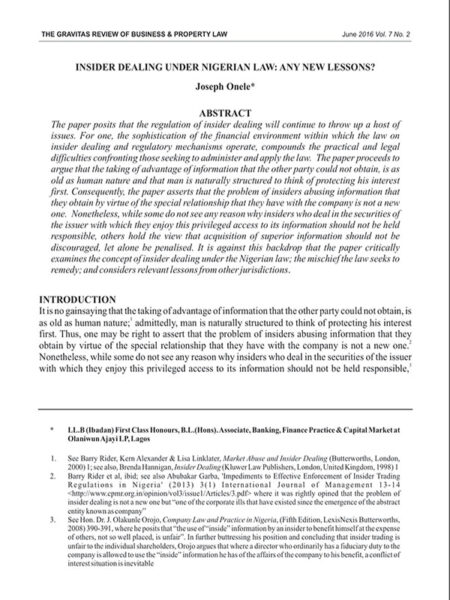
Insider Dealing under Nigerian Law: Any New Lessons?
0₦2,500.00Joseph Onele, Associate, Olaniwun Ajayi LP in “Insider Dealing Under Nigerian Law: Any New Lessons?” undertakes a comprehensive review of the legal framework for dealing with insider trading under Nigerian Law. He identifies notable gaps in the law and indicates lessons that can be learnt from other jurisdictions including the U.S and UK.
-
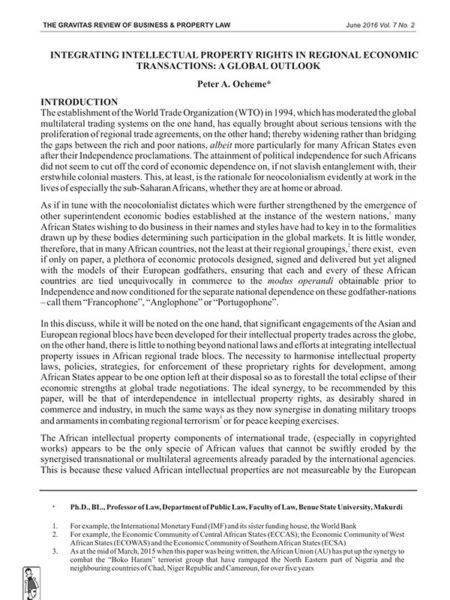
Integrating Intellectual Property Rights in Regional Economic Transactions: A Global Outlook
0₦2,500.00Professor Peter Ocheme of the Department of Public Law, Faculty of Law, Benue State University, Makurdi in his article, “Integrating Intellectual Property Rights in Regional Economic Transactions: A Global Outlook” examines African, European, American and Asian efforts at integrating intellectual property rights in regional economic transactions and the varying levels of success. He notes that while significant engagements of the Asian and European regional blocs have been developed for their intellectual property trades across the globe, there is little or nothing beyond national laws and efforts at integrating intellectual property issues in African regional trade blocs. He interrogates the concept and relevance of intellectual property rights protocols and agreements to developing countries and contends that they may have sacrificed their individual and collective efforts at the altar of international law and diplomacy.
-
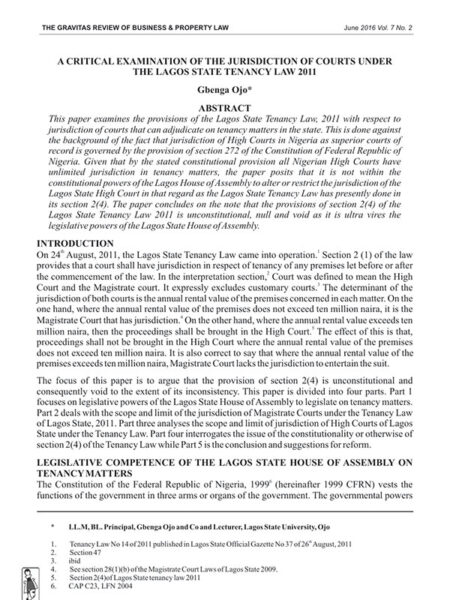
A Critical Examination of the Jurisdiction of Courts under the Lagos State Tenancy Law 2011
0₦2,500.00Against the background of the Tenancy Law of Lagos State 2011, Olagoke Odubunmi, Lagos based legal practitioner, in his article “Unmasking the Legal Complexities in the Termination of Fixed and Periodic Tenancies” seeks to unravel the complexities, technicalities and slippery landmines into which legal practitioners, property managers, agents and landlords, do unsuspectingly often fall into in the process of recovery of premises, most especially in the termination of fixed and periodic tenancies.
-
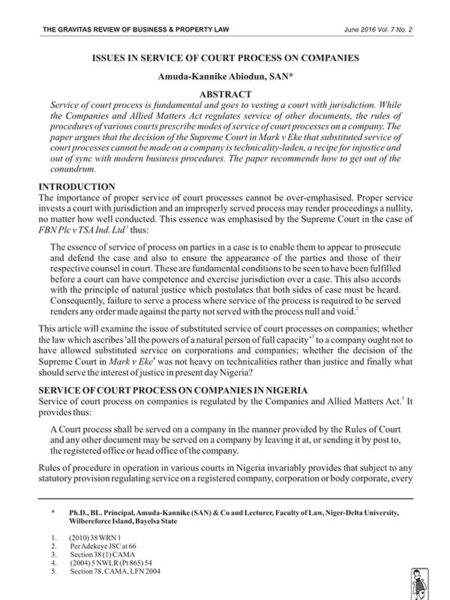
Issues in Service of Court Process on Companies
0₦2,500.00Dr Abiodun Amuda-Kannike SAN, Principal, Amuda-Kannike (SAN) & Co and Lecturer, Faculty of Law, Niger-Delta University, Wilberforce Island in his article, “Issues in Service of Court Process on Companies” examines the provision of the Companies and Allied Matters Act and various Rules of Court on service of court processes on companies. He bemoans the decision of the Supreme Court in Mark v Eke, that substituted service of court processes cannot be made on a company, as technicality-laden, a recipe for injustice and out of sync with modern business process.
-
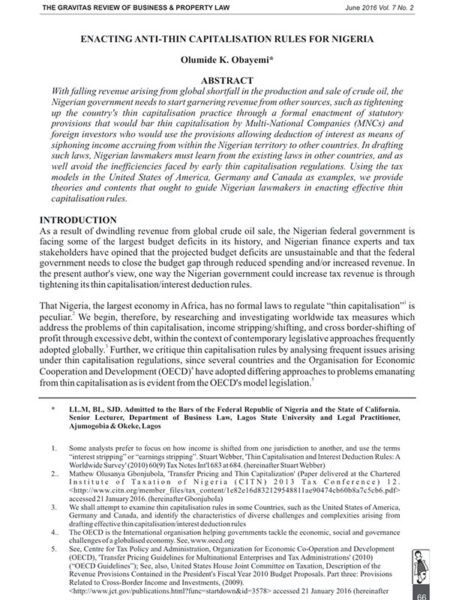
Enacting Anti-thin Capitalisation Rules for Nigeria
0₦2,500.00Dr Olumide Obayemi, Legal Practitioner, Ajumogobia & Okeke and Senior Lecturer, Department of Business Law, Lagos State University Ojo, examines an important topic that straddles corporate law, corporate finance and taxation. In his article, “Enacting Anti-Thin Capitalisation Rules for Nigeria”, he examines a financing strategy mostly favoured by multinational corporations (MNCs) in making investments outside their home nations. As debt is often a more tax efficient method of finance than equity because interest is tax deductible while dividend is not, most jurisdictions have prescribed rules to deal with the debt/equity mix by placing a ceiling on debt/equity ratio so that their tax base is not eroded as foreign firms finance their subsidiaries with excessive debt. Dr Obayemi explores anti-thin capitalisation rules in several jurisdictions and advocates the enactment of effective anti-thin capitalisation rules in Nigeria with a safe harbour of 1.5 to 1 debt-to-equity as the starting point.
-
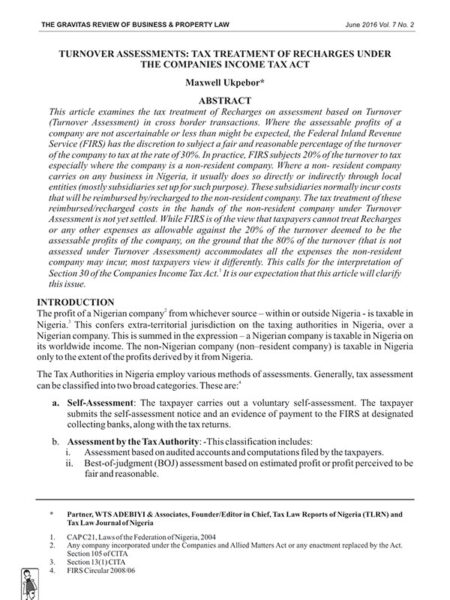
Turnover Assessments: Tax Treatment of Recharges under the Companies Income Tax Act
0₦2,500.00Maxwell Ukpebor, Partner, WTS ADEBIYI & Associates, Founder/Editor in Chief, Tax Law Reports of Nigeria (TLRN) and Tax Law Journal of Nigeria in his article “Turnover Assessments: Tax Treatment of Recharges Under the Companies Income Tax Act” examines the unsettled issue of tax treatment of Recharges on Turnover Assessment in cross border transactions. Where the assessable profits of a company are not ascertainable or less than might be expected, the Federal Inland Revenue Service (FIRS) has the discretion to subject a fair and reasonable percentage of the turnover of the company to tax at the rate of 30%. In practice, where the company is a non-resident company, FIRS subjects 20% of the turnover to tax. Costs incurred by local subsidiaries of non-resident companies are normally reimbursed by/recharged to the non-resident company. Are the costs and expenses (called Recharges) allowable or not against the 20% Turnover? While most tax payers believe they are allowable, FIRS “thinks not”. Mr. Ukpebor in this masterly exposition clarifies the issue in controversy.
-
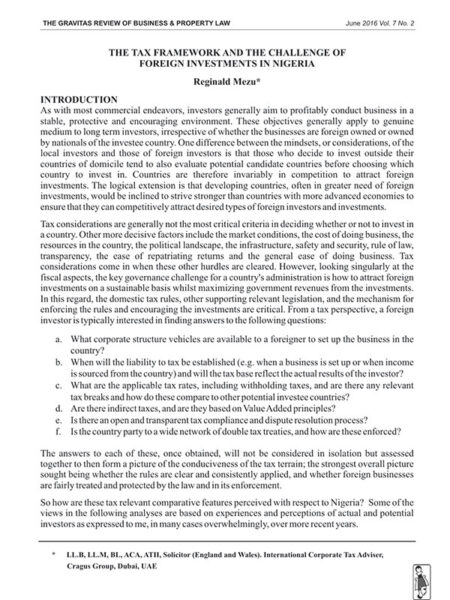
The Tax Framework and the Challenge of Foreign Investments in Nigeria
0₦2,500.00Reginald Mezu, International Corporate Tax Adviser, Cragus Group, Dubai, UAE in his article, “The Tax Framework and The Challenge of Foreign Investments in Nigeria” posits that Nigeria has fared badly in attracting foreign investments, save in the oil and gas industry (possibly due to the natural resource simply being located in the country) or the telecommunications industry (possibly due to the population demand and the surfeit of supply from the public services) because it has failed to make the grade in relevant parameters that foreign investors consider. He recommends flexibility in the options for foreign investors to establish operating entities in the country, clearer tax rules and better targeted tax incentives, among others, to send a strong signal that the country is ready to do business with foreign investors in a stable, protective and encouraging environment.
The Gravitas Review of Business & Property Law



